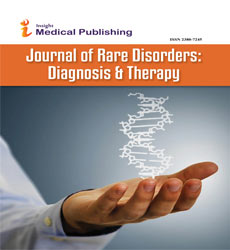Economic and Ethical Considerations in Rare Disease Drug Development
Jenna Pucel
Department of Infectious Diseases, St Vincent's University, Dublin, Ireland
Published Date: 2024-04-29DOI10.36648/2380-7245.10.2.162
Jenna Peters*
Department of Infectious Diseases, St Vincent's University, Dublin, Ireland
- *Corresponding Author:
- Jenna Peters
Department of Infectious Diseases, St Vincent's University, Dublin,
Ireland,
E-mail: jenna@gmail.com
Received date: March 29, 2024, Manuscript No. IPRDDT-24-19205 Editor assigned date: April 01, 2024, PreQC No. IPRDDT-24-19205 (PQ); Reviewed date: April 15, 2024, QC No. IPRDDT-24-19205; Revised date: April 22, 2024, Manuscript No. IPRDDT-24-19205 (R); Published date: April 29, 2024, DOI: 10.36648/2380-7245.10.2.162
Citation: Peters J (2024) Economic and Ethical Considerations in Rare Disease Drug Development. J Rare Disord Diagn Ther Vol.10 No.2: 162.
Description
This article delves into the current state of rare disease therapeutics, highlighting the scientific advancements, regulatory frameworks, and the ongoing challenges in this critical field. Rare diseases are defined as conditions that affect a small fraction of the population. In the European Union, a disease is rare if it impacts fewer than 1 in 2,000 people. There are over 7,000 identified rare diseases, most of which are genetic in origin and manifest early in life. The rarity of these diseases often results in a lack of understanding and awareness, delayed diagnoses, and limited treatment options. This has spurred the medical and scientific communities to focus on developing novel therapeutics to address these unmet medical needs. The small patient populations make it difficult to conduct large-scale clinical trials. Additionally, the genetic heterogeneity of these diseases means that treatments often need to be highly specialized. Recognizing the need for rare disease therapeutics, governments and regulatory bodies have implemented various incentives to encourage drug development.
Genetic therapies
One of the most promising advancements in rare disease therapeutics is the rise of precision medicine and genetic therapies. For rare diseases, this often means developing therapies that target the specific genetic mutations causing the disease. Gene therapy, in particular, has shown remarkable potential. By introducing, removing, or altering genetic material within a patient's cells, gene therapy aims to treat or cure diseases at their source. The approval of gene therapies for conditions like Spinal Muscular Atrophy (SMA) and inherited retinal diseases marks a significant milestone in this field. Small molecule drugs and biologics continue to play a vital role in rare disease therapeutics. Small molecules, due to their size and ability to easily enter cells, can modulate various biological processes. Biologics, including monoclonal antibodies, enzymes and other protein-based therapies, offer highly specific mechanisms of action, making them suitable for treating complex rare diseases. For example, Enzyme Replacement Therapy (ERT) has been a breakthrough for lysosomal storage disorders.
Clinical trial designs
Despite the progress, access to rare disease therapeutics remains a significant challenge. The high cost of drug development often translates to expensive treatments, which can be prohibitive for patients and healthcare systems. Ensuring affordability and equitable access to these therapies is a critical issue that needs to be addressed. Various strategies are being to solve this problem, including public-private partnerships and policy reforms. Additionally, patient advocacy groups play a vital role in raising awareness and driving policy changes to improve access to treatments. The complexity of rare diseases necessitates ongoing research and development efforts. Advancements in genomics, bioinformatics and biotechnology are essential for identifying new therapeutic targets and developing effective treatments. Collaborative research initiatives and patient organizations are crucial for pooling resources and expertise. Furthermore, adaptive clinical trial designs and the use of real-world evidence are being explored to overcome the challenges of small patient populations. These approaches aim to make clinical trials more efficient and inclusive, accelerating the development of rare disease therapeutics. The future of rare disease therapeutics lies in personalized and combination therapies. Personalized medicine ensures that treatments are tailored to the unique characteristics of each patient, maximizing efficacy and minimizing adverse effects. Combination therapies, which involve using multiple drugs or treatment modalities, hold promise for addressing the multifaceted nature of rare diseases. The integration of artificial intelligence and machine learning in drug discovery and development to revolutionize the field.
Open Access Journals
- Aquaculture & Veterinary Science
- Chemistry & Chemical Sciences
- Clinical Sciences
- Engineering
- General Science
- Genetics & Molecular Biology
- Health Care & Nursing
- Immunology & Microbiology
- Materials Science
- Mathematics & Physics
- Medical Sciences
- Neurology & Psychiatry
- Oncology & Cancer Science
- Pharmaceutical Sciences
